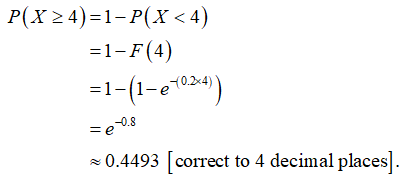The amount of time, T, that the effect of caffeine is felt on your body after drinking a cup of coffee is given by a continuous random variable with an exponential distribution. On average, caffeine is felt for about 5 hours after drinking the cup. (Answer part a-c) a. What is the probability that the effect lasts at least 4 hours? b. What is the probability that the effect lasts fewer than 6 hours? c. You usually go to sleep at 11:30 pm, and drink exactly one cup of coffee a day. Suppose you wish to guarantee at most a 5% chance of feeling the effects of caffeine when you go to sleep. What's the latest that you should drink your only cup of coffee?
Continuous Probability Distributions
Probability distributions are of two types, which are continuous probability distributions and discrete probability distributions. A continuous probability distribution contains an infinite number of values. For example, if time is infinite: you could count from 0 to a trillion seconds, billion seconds, so on indefinitely. A discrete probability distribution consists of only a countable set of possible values.
Normal Distribution
Suppose we had to design a bathroom weighing scale, how would we decide what should be the range of the weighing machine? Would we take the highest recorded human weight in history and use that as the upper limit for our weighing scale? This may not be a great idea as the sensitivity of the scale would get reduced if the range is too large. At the same time, if we keep the upper limit too low, it may not be usable for a large percentage of the population!
The amount of time, T, that the effect of caffeine is felt on your body after drinking a cup of coffee is given by a continuous random variable with an exponential distribution. On average, caffeine is felt for about 5 hours after drinking the cup. (Answer part a-c)
a. What is the
b. What is the probability that the effect lasts fewer than 6 hours?
c. You usually go to sleep at 11:30 pm, and drink exactly one cup of coffee a day. Suppose you wish to guarantee at most a 5% chance of feeling the effects of caffeine when you go to sleep. What's the latest that you should drink your only cup of coffee?
Introduction:
For an exponentially distributed random variable X, with mean λ, the cumulative distribution function (cdf) at the point X = x is:

Here,

Thus, the cdf is:

(a)
The probability that the effect lasts at least 4 hours is 0.4493, as calculated below:

Step by step
Solved in 4 steps with 6 images









